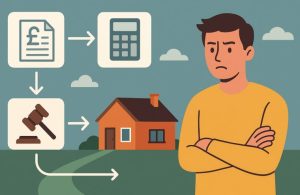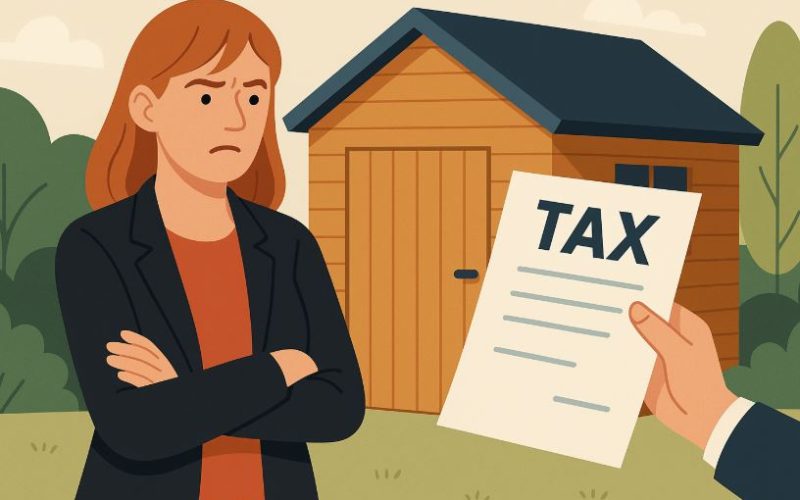Could a humble garden shed really land you with a bigger council tax bill? In 2025, a political storm erupted when proposals linked to Deputy Prime Minister Angela Rayner sparked fears that sheds, garden offices, and even allotments might face higher taxation.
While the debate has been framed as a fairer way to redistribute local tax burdens, critics argue it’s another cash grab by struggling councils.
Across the UK, residents have shared stories of unexpected bills, unexpected reclassifications of property features, and even council officials peering over hedges in search of taxable improvements.
This growing unease has become known in the media and among the public as the Angela Rayner Garden Shed Tax debate.
This article will break down the origins of the policy debate, the tactics councils are using, the legal rights homeowners have, and what the potential long-term consequences might be for property owners across the UK.
How Did the Angela Rayner Garden Shed Tax Controversy Begin?

The controversy began with the revelation that local councils were increasingly using their powers to reassess properties, sometimes in ways that seemed opportunistic.
Angela Rayner, in her role as Deputy Prime Minister, has been a vocal supporter of reforming the council tax system, which still relies on property valuations from 1991.
The goal, according to her office, is to make the system fairer by ensuring wealthier areas and higher-value properties contribute more to local budgets.
However, the practical effects of this push for reform have created public backlash. In one widely shared example, actor James Buckley, best known for playing Jay in The Inbetweeners, expressed outrage when his Chelmsford council began charging £60 for the removal of garden waste bins, a service previously included in council tax.
His viral social media post captured the sentiment of many residents: councils are charging more while delivering less.
From there, the debate escalated as more cases emerged. Some councils have reclassified sheds, spare rooms, or even small extensions as separate annexes, triggering additional council tax charges. Others have moved properties into higher tax bands following inspections, sometimes based on minor structural changes.
By mid-2025, the term “Angela Rayner Garden Shed Tax” had become shorthand for a range of measures, some real, others perceived, that residents believe target ordinary homeowners rather than focusing on genuine high-value property reform.
Why Are Councils Targeting Sheds, Annexes, and Outbuildings?
The financial reality for many local authorities in 2025 is stark. Rising social care costs, increasing staff wages, and large existing debts have left councils searching for new revenue streams.
While central government funding has not kept pace with these pressures, councils have turned to creative, and often controversial, ways of raising income.
Reclassifying sheds, annexes, or outbuildings as taxable spaces is one such tactic. If a garden building is considered self-contained, meaning it has its own sleeping area, kitchen, and bathroom, it can be classed as a separate dwelling and charged council tax in its own right.
Even without full self-containment, councils have sometimes used these structures as justification for moving a property into a higher tax band.
Financial Pressures Driving These Tactics
- Growing demands for adult social care funding
- Higher operational costs for waste collection, road maintenance, and public services
- Legal obligations to balance budgets each financial year
- Political pressure to avoid outright service cuts, leading to revenue-raising alternatives
This has led to what critics describe as “council snooping”, where officials proactively look for unreported home improvements. The Angela Rayner Garden Shed Tax debate has amplified these concerns, with residents fearing that even modest upgrades could trigger unexpected bills.
Is the Angela Rayner Garden Shed Tax Part of a Wider Council Tax Overhaul?

Angela Rayner’s position has been that the UK’s council tax system is outdated and in need of reform. The current model is based on property values from 1991, which means a small London flat today could pay proportionally less tax than a much larger rural home simply because of historical valuation differences.
Under proposed reforms, there could be new tax bands for the most valuable homes, particularly in high-cost areas like London and the South East.
Supporters argue that this would correct long-standing imbalances and ensure that wealthier property owners contribute more to local budgets.
However, critics say that in practice, the implementation risks hitting ordinary families. When combined with council-led revaluations triggered by property improvements or the presence of outbuildings, the effect feels like a stealth tax.
How This Links to the Garden Shed Debate?
The “garden shed” label is symbolic. It reflects fears that even small, non-residential structures could be swept into a net of higher taxation.
Although Angela Rayner has not explicitly proposed taxing basic sheds, the broader revaluation climate makes many homeowners nervous that local authorities could use policy shifts to justify more aggressive inspections and reclassifications.
How Do Council Snoopers Identify Homes for Rebanding?
One of the most controversial aspects of the Angela Rayner Garden Shed Tax debate is the way councils and the Valuation Office Agency (VOA) identify properties for rebanding.
Common Identification Methods
- Reviewing planning applications to spot extensions or conversions
- Physically driving through neighbourhoods looking for visible changes
- Checking property details when a home is sold
- Using aerial photography or satellite imagery to spot outbuildings
Although property values for council tax purposes must still be based on 1991 figures, any major structural changes made since then can trigger a reassessment. This includes not just full extensions, but also conversions of garages or outbuildings.
Lawyers specialising in council tax disputes have reported a sharp rise in clients who feel they’ve been unfairly targeted. In some cases, residents have seen council staff peering over hedges or slowing down outside properties to spot potential changes.
Could Your Garden Office or Allotment Be Taxed Under New Rules?
One concern raised in 2025 is whether the growing trend of home-based workspaces and leisure plots could fall into the taxable category. Garden offices, in particular, have surged in popularity since the pandemic, offering a quiet place to work away from the main house.
If such a building is considered self-contained, with facilities for sleeping, cooking, and washing, it could be taxed separately. However, even without full self-containment, the presence of a high-quality outbuilding can contribute to an argument for moving a property into a higher band.
Allotments, while traditionally exempt, have also come under scrutiny in media commentary. Some opinion writers suggest that future revaluation policies could include better-equipped allotment sheds if they meet certain thresholds, though this remains speculative rather than confirmed policy.
What Steps Can Homeowners Take to Challenge a Council Tax Hike?

When a property’s tax band is changed by the VOA, it’s up to the homeowner to prove it’s wrong. This can be an exhausting process involving both the local council and the VOA, with each sometimes referring residents back to the other.
Practical Steps for Challenging a Council Tax Increase
- Check your property details on the VOA’s database to see if the listing is correct
- Gather evidence, such as floor plans, photographs, and historical records — showing why the rebanding is incorrect
- Submit a formal challenge to the VOA through the official government portal
- Keep detailed records of all correspondence and responses
- If the challenge is rejected, lodge an appeal with the Valuation Tribunal within three months
While legal assistance can speed up the process, it’s not always necessary. In 2024, of 43,000 challenges made, around 10,500 were successful.
Consumer organisations like the HomeOwners Alliance provide free advice to help residents navigate the process.
How Are Ordinary Residents Affected by the Angela Rayner Garden Shed Tax Proposals?
Stories from across the UK illustrate the human impact of council revaluations.
Simon Dyer, a Somerset farmer, saw his Band G farmhouse tax bill climb to £3,676, with an additional £2,941 charged for a flat inside the property that had been reabsorbed into the main home. Despite assurances that someone would inspect, he has been waiting over a year while still paying the bill.
In Kent, Alan Alexander received a final demand for £1,400 in tax for what the council deemed a converted annex.
In reality, it was a run-down shed. After six months of calls and sending photographic evidence, the VOA finally acknowledged the error.
These cases highlight the stress, time, and financial pressure caused by rebanding disputes, particularly when communication between councils and the VOA breaks down.
Can a Dilapidated Shed Really Be Classified as a Taxable Annex?
While it may sound absurd, the answer is yes, at least initially. If a structure has planning permission for conversion into a living space, councils may attempt to classify it as an annex, even if the work was never completed.
Factors That Can Trigger Annex Classification
| Factor | Tax Implication |
| Separate entrance | Likely to be considered independent dwelling |
| Kitchen facilities | Strong case for separate council tax band |
| Bathroom facilities | Supports self-contained classification |
| Planning permission granted | May trigger inspection even without completion |
| Physical separation from main property | Higher chance of independent banding |
This is why photographic evidence and detailed documentation are critical when challenging such decisions.
What Legal and Free Support Options Exist for Fighting a Council Tax Reassessment?

Residents have several avenues for support:
- Specialist lawyers who handle council tax disputes, often on a fixed daily rate
- Free advice from consumer advocacy organisations
- Step-by-step guidance on the official government site for lodging challenges and appeals
While hiring a lawyer can cost hundreds of pounds a day, many homeowners recover more than they spend if their banding is successfully reduced.
Free services can be equally effective for straightforward cases, provided the homeowner is prepared to do the research and paperwork themselves.
How Might Angela Rayner’s Garden Shed Tax Impact Property Owners in the Long Run?
The long-term effects depend on whether proposed council tax reforms are implemented in their current form. If wealth-based rebanding becomes the norm, high-value properties will bear a larger share of the burden.
However, if councils continue to aggressively pursue reclassifications of modest outbuildings, ordinary homeowners could face ongoing uncertainty.
Over time, this could influence property decisions. Some may avoid making improvements that could be construed as taxable upgrades, while others might factor potential rebanding into their budgets when buying a home.
The Angela Rayner Garden Shed Tax controversy has exposed a deeper question about fairness in local taxation: how to balance the need for adequate funding with the rights of property owners to enjoy their homes without disproportionate financial penalty.
Conclusion
The Angela Rayner Garden Shed Tax debate is about much more than sheds. It’s a collision of political ambition, financial necessity, and public trust.
While Angela Rayner’s stated goal is to modernise an outdated council tax system, the reality on the ground has seen homeowners facing unexpected bills, intrusive inspections, and protracted disputes.
For some, this is a necessary correction to decades of imbalance in property taxation. For others, it’s proof that councils are overreaching in their search for revenue.
As reforms progress, the challenge will be finding a system that funds essential services without unfairly penalising residents for having a garden shed, an annex, or any other modest improvement.
FAQs
How are council tax bands currently determined?
They are based on property values from 1991, with adjustments possible after major structural changes or when a property is sold.
Can a basic garden shed be taxed separately?
Only if it is considered self-contained with living facilities, but councils may still use it as evidence in a rebanding case.
What should I do if I disagree with my council tax band?
Submit a challenge to the Valuation Office Agency with evidence, and if rejected, appeal to the Valuation Tribunal within three months.
Are allotments included in the Angela Rayner Garden Shed Tax?
Not directly, but better-equipped structures on allotments could be scrutinised under broader revaluation powers.
Do I need a lawyer to fight a council tax reassessment?
No, many cases can be handled personally, but lawyers can help in complex disputes.









